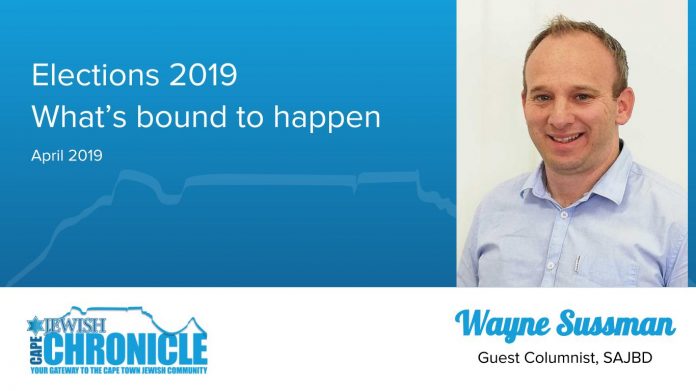The readers of the Cape Jewish Chronicle can count themselves lucky. They live in one of the two provinces in the 2019 elections that will be hotly contested. The Western Cape is the only province not run by the African National Congress (ANC). The ANC hopes that under President Cyril Ramaphosa’s leadership, it will regain the ground it lost in 2009 and 2014.
As we march towards the 2019 national and provincial elections, the DA, after narrowly getting over 50% in 2009, won just under 60% of the vote in the 2014 Western Cape provincial elections under Helen Zille’s leadership, but now finds itself in a vulnerable position. Since 2016 it has not been smooth sailing for the DA. Its image as the party of good governance become one of a party of internal ineptness as a result of the perception of the way the city and the province handled the drought as well as the drawn-out imbroglio with former Cape Town Mayor Patricia De Lille, during which the party was on the whole incapable of explaining why she had to face the axe.
This time round De Lille’s GOOD party is the new kid on the block. While few would deny that her provincial (and national profile) is higher today than it was when she formed the Independent Democrats (ID) before the 2004 elections, she will battle to replicate her showing in 2004 when the ID won 3 seats in the legislature. The Economic Freedom Fighters (EFF) laboured in the Western Cape in 2014, ending up with one seat in the legislature. They continue to struggle to shake the province the way they have done in Limpopo and the North West. The African Christian Democratic Party (ACDP) came fourth in 2014, also getting a seat in the legislature. It has been taking DA votes in by-elections and hopes to end up with a second seat. The Freedom Front Plus (VF+) also hopes to pick up a seat – it has been attracting more conservative voters from the DA and picking up votes in traditionally coloured areas.
There are three possible outcomes in the Western Cape in 2019
Scenario 1: DA has an outright victory
Not even the most blue-dyed in wool DA supporter would think that the party would match their 2014 performance. Alan Winde, the premier candidate, does not have the name recognition of Zille or De Lille, and the party’s fortunes have waned. Having said that, it would be very hard for the DA to fall under 50% and it would have to lose 17-18% of their current support in the province for that to occur. If one analysed the 2018 by-elections one might think it possible, but the recent by-election returns show that these losses have been stemmed and the party is on track to govern without coalition partners albeit with a reduced majority.
Scenario 2: DA governs with conservative parties
While the by-elections in 2018 showed a shift away from the DA to the ANC in parts of the West Coast district, yet in one by-election in Oudtshoorn, a traditional DA stronghold, the DA lost very little ground to the ANC, and precious little of its support to the ANC in ANC heartland areas. In a key by-election on the Cape Flats, the DA did not lose ground to the ANC but lost to the smaller, ACDP. The ACDP and the Freedom Front Plus (VF+) appear to be the more likely beneficiaries of disgruntled DA voters in Western Cape by-elections and if the DA were to fall under 50%, it is plausible that they would turn to these parties to hold onto power.
Scenario 3: De Lille becomes Premier with the support of the ANC and the EFF
The ANC will at the very least be the second biggest party in the Western Cape after the 2019 provincial elections. They will finish way ahead of Patricia De Lille’s GOOD party, and the Economic Freedom Fighters (EFF). Having said that, it is unclear whether the ANC will announce a premier candidate for the Western Cape, and whether Ebrahim Rasool will get a second chance or whether provincial secretary Faiez Jacobs will be their preferred choice. Even if the ANC were to work with GOOD, it is unlikely that they will have the numbers to get over 21 seats in the province. Both parties would need to turn to the EFF. The ANC has been generous to junior coalition partners in municipalities like Nelson Mandela Bay (Port Elizabeth), Metsimaholo (Sasolburg) and Bitou (Plettenberg Bay) by agreeing to give the mayoral chains to parties significantly smaller than it. I would suspect that the ANC would agree to offer Patricia De Lille the premiership in a multi-party coalition.
My prediction is that Scenario 1 will come true.
Western Cape Provincial Legislature Seats
| DA | 22 (26) * |
| ANC | 15 (14) |
| GOOD | 2 (0) |
| EFF | 1 (1) |
| ACDP | 1 (1) |
| VF+ | 1 (0) |
| Total | 42 |
* Brackets indicate showing in 2014 elections
Disclaimer: The views and opinions expressed in this article are those of the authors and do not necessarily reflect the official policy or position of the Cape SAJBD or CJC.
Click here to visit the website
Click here to read our Pesach 2019 content
Click here for an article by Howard Sackstein about the ANC











